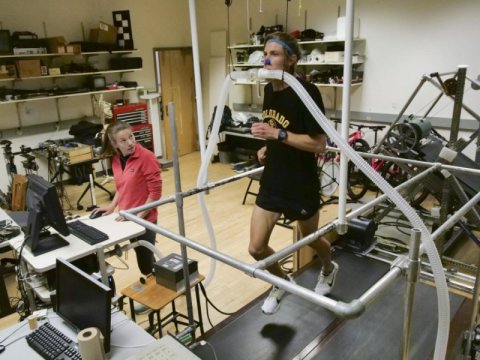New research suggests that the relationship between physical and brain fitness varies in older adults by virtue of their sex. The study is published ahead of print in the Journal of Applied Physiology. Cardiorespiratory fitness is the measure of how much — and how well — oxygen is delivered to the muscles during exercise. Fitness level has also been associated with changes in the brain’s nerve-rich tissue, called gray matter, and better cognitive function in later life. Previous studies have also found cardiorespiratory fitness to be related to how the brain…
Read MoreCategory: Health
Transparent loudspeakers and MICs that let your skin play music
An international team of researchers, affiliated with UNIST has presented an innovative wearable technology that will turn your skin into a loudspeaker. This breakthrough has been led by Professor Hyunhyub Ko in the School of Energy and Chemical Engineering at UNIST. Created in part to help the hearing and speech impaired, the new technology can be further explored for various potential applications, such as wearable IoT sensors and conformal health care devices. In the study, the research team has developed ultrathin, transparent, and conductive hybrid nanomembranes with nanoscale thickness, consisting…
Read MoreHow the brain responds to texture
Our hands and fingertips are amazingly sensitive to texture. We can easily distinguish coarse sandpaper from smooth glass, but we also pick up more subtle differences across a wide range of textures, like the slick sheen of silk or the soft give of cotton. Information about texture is transmitted from sensors in the skin and through the nerves to the somatosensory cortex, the part of the brain responsible for interpreting the sense of touch. New research by neuroscientists at the University of Chicago shows that as neurons in this part…
Read MoreSlower runners benefit most from elite methods
Think state-of-the-art shoes, performance diets and well-thought-out racing strategies are only for elite runners? Think again. In reality, the slower you are, the more such measures improve your finish times, suggests new University of Colorado Boulder research. “We found that at faster speeds, you get significantly less benefit from improving your running economy than you do at slower speeds,” said lead author Shalaya Kipp, a former graduate student in the Department of Integrative Physiology. The study, published in the journal Frontiers in Physiology today, takes a mathematical approach to answering a question…
Read MoreThe potentially deadly bacterium that’s on everyone’s skin
Forget MRSA and E. coli. There’s another bacterium that is becoming increasingly dangerous due to antibiotic resistance — and it’s present on the skin of every person on the planet. A close relative of MRSA, Staphylococcus epidermidis, is a major cause of life-threatening infections after surgery, but it is often overlooked by clinicians and scientists because it is so abundant. Researchers from the Milner Centre for Evolution at the University of Bath warn that the threat posed by this organism should be taken more seriously and use extra precautions for those at…
Read More




